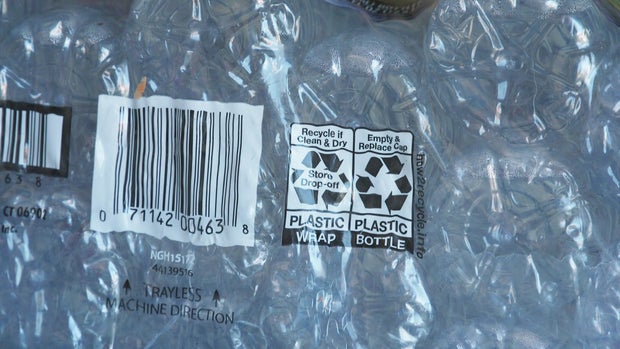Jan Dell is a former chemical engineer who spent years telling an inconvenient truth about plastics. “So many people see the recyclable label and put it in the recycling bin,” she said. “But the vast majority of plastics are not recycled.”
About 48 million tons of plastic waste are generated in the US every year; only 5 to 6 percent of it is actually recycled, according to the Department of Energy. The rest goes to landfills or is burned.
Dell founded a non-profit organization, The last beach cleaning, to combat plastic pollution. Inside his garage in Southern California there are all kinds of plastic with those little arrows that make us think they can be recycled. But she said, “You’re lying.”
So-called chase arrows began appearing on plastic products in 1988 as part of an effort to convince the public that plastic waste was not a problem because it can be recycled.
CBS News
Davis Allen, investigative researcher at Center for Climate Integritysaid that the industry did not need recycling to function: “They needed people to to believe that it was working,” he said.
A new report, called “The Plastic Recycling Scam,” accuses the plastics industry of a decades-long campaign “…to mislead the public about the viability of plastic recycling,” despite knowing the “technical and economic limitations that make plastics unrecyclable” on a large scale.
“They could never lie about the existence of plastic waste,” Allen said. “But they created a lie about how we could solve the problem, and that was recycling.”
Tracy asked: “If plastic recycling is technically difficult, if it doesn’t make much economic sense, why did the plastics industry push it?”
“The plastics industry understands that selling recycling sells plastic, and they will say just about anything necessary to keep doing that,” Allen responded. “That’s how they make money.”
Plastic is made from oil and gas and comes in thousands of varieties, many of which cannot be recycled together. But in the 1980s, when some municipalities decided to ban plastic products, the industry began to promote the idea of recycling as a solution.
Allen showed us documents and meeting notes obtained from public archives and from a former employee of the American Plastics Council. “What we see here is a widespread knowledge that plastics recycling wasn’t working,” he said.
At a trade conference in Florida in 1989, an industry leader told attendees, “Recycling cannot continue indefinitely and does not solve the solid waste problem.”
In 1994, an Exxon executive told plastics board staff that when it comes to recycling, “we are committed to activities, but not to results.”
Allen said, “They always looked at recycling not as a real technical problem they needed to solve, but as a public relations problem.”
The industry has just launched a new advertising campaign called “Recycling is real” and claims to be investing in what it calls advanced recycling technology.
The American Chemistry Councilan industry trade group, responded to “CBS Sunday Morning” in a statement, calling the Center for Climate Integrity’s report “flawed” and “outdated” and saying that “plastic manufacturers are working hard to change the way plastics are made and recycled.”
Jan Dell doesn’t believe plastic will ever be truly recyclable: “It’s the same process they tried 30 years ago, and my response to that is that it’s science fiction,” she said.
Plastic production is expected to triple by 2050, and with so much plastic waste piling up on land and sea, more than 170 countries are working on a United Nations treaty to end plastic pollution.
In a letter to President Biden about the negotiations, the plastics industry says it opposes any ban on plastic production but supports more recycling.
To which Dell says: “The only thing the plastics industry has really recycled is its lies over and over again.”
For more information:
Story produced by John Goodwin. Editor: Emanuele Secci.
See too:
























